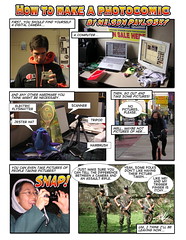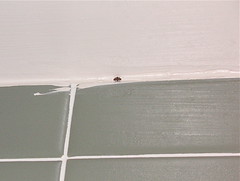The Pavlosky-Stokes Law: It takes no more than six clicks on the internet to get from legitimate, work-related research to porn.
Monthly Archives: May 2005
How to make a photocomic
My final project for Technology, Self and Society at Swarthmore is finally done, although I didn’t get to do half of the things that I wanted to do with it. It’s hard to make more than one or two photocomic pages a day, especially if you edit even so much as one photo rather than simply dropping it on the page, or if you care about finding freely licensed photos… this represents somewhere between 5 and 10 days of work.
At any rate, check out my How to make a photocomic Flickr set… I plan to expand and update that photocomic later in the summer, as well as making some real photocomics that aren’t just about making photocomics 🙂
women in punk
I was making a mix CD for a certain special someone yesterday, specifically the ULTIMATE punk collection, and I started going through old mixes to see if there were any awesome punk songs that I had forgotten. While looking through a mix CD I made for Desirina once, I spotted a song by the Donnas, and I said, “Aha! That’s an awesome song that is missing from my ultimate punk collection!” I stuck it into the mix, and then I observed the song in its new context to see how it looked… suddenly, something jumped out at me.
This was the only band which had obvious female members on the entire CD! The first band, the Anniversary, has a female singer/keyboardist, but she’s only singing backup vocals on the song that I selected. I thought, “hm, that’s no good, if my mysterious special someone is going to punk out, she’s going to need some role models,” so I started digging in my dozens of gigabytes of music to see what I could come up with. I pulled out another song or two played by women which had been stuck in my head at some point or another, but the fact was that most of the punk rock that I listen to is written and played exclusively by guys, and that seems to be pretty much true for punk rock in general, not just my listening tastes (although I can’t stand some influential women in the genre, such as Bikini Kill, I think they’re kind of annoying). In fact, it might be true of rock in general.
What’s to be done? Why aren’t there more girls who like to sing/play loud music? Is it just a masculine aggressive thing to make noise? One website I visited said that guys have support networks where they can learn guitar licks, learn how to silkscreen, etc. and girls don’t, so it’s kind of a catch-22. I dunno if that’s true, but clearly girls need to rock out more.
R.G. Collingwood – Free Culture, circa 1938?
R.G. Collingwood wrote this passage which was published in his book “The Principles of Art” around 1938 (emphases are mine):
To begin by developing a general point already made in the preceding chapter: we must get rid of the conception of artistic ownership. In this sphere, whatever may be true of others, “property is theft.” [quotation translated from French] We try to secure a livelihood for our artists (and God knows they need it) by copyright laws protecting them against plagiarism; but the reason why our artists are in such a poor way is because of that very individualism which these laws enforce. If an artist may say nothing except what he has invented by his own sole efforts, it stands to reason he will be poor in ideas. If he could take what he wants wherever he could find it, as Euripedes and Dante and Michelangelo and Shakespeare and Bach were free, his larder would always be full, and his cookery might be worth tasting.
This is a simple matter, and one in which artists can act for themselves without asking help (which I am afraid they would ask in vain) from lawyers and legislators. Let every artist make a vow, and here among artists I include all such as write or speak on scientific or learned subjects, never to prosecute or lend himself to a prosecution under the law of copyright. Let any artist who appeals to that law be cut by his friends, asked to resign from his clubs, and cold-shouldered by any society in which right-thinking artists have influence. It would not be many years before the law was a dead letter, and the strangle-hold of artistic individualism in this one respect a thing of the past.
This, however, will not be enough unless the freedom so won is used. Let all such artists as understand one another, therefore, plagiarize each other’s work like men. Let each borrow his friends’ best ideas, and try to improve on them. If A thinks himself a better poet than B, let him stop hinting it in the pages of an essay; let him re-write B’s poems and publish his own improved version. If X is dissatisfied with Y’s this-year Academy picture, let him paint one caricaturing it; not a sketch in Punch, but a full-sized picture for next year’s Academy. I will not rely upon the hanging committee’s sense of humour to the extent of guaranteeing that they would accept it; but if they did, we should get brighter Academy exhibitions. Or if he cannot improve on his friends’ ideas, at least let him borrow them; it will do him good to try fitting them into works of his own, and it will be an advertisement for the creditor. An absurd suggestion? Well, I am only proposing that modern artists should treat each other as Greek dramatists or Renaissance painters or Elizabethan poets did. If any one thinks that the law of copyright has fostered better art than those barbarous times could produce, I will not try to convert him.
It really annoys me that if we had rational copyright laws, this book would be in the public domain. Over in Britain, Elvis is finally coming into the public domain, and this book was written well before Elvis began on his career. Ironically, this book which contains such a powerful denunciation of copyright law cannot be found on the open web, because it’s not due to come into the public domain in America until sometime around 2040. Even then, it could still become the victim of yet another Copyright Extension Act if we fail to build a strong free culture movement before that time. Sadly, this book cannot be published freely in the greatest library ever built: the World Wide Web. When it can be, I will be the first to sign up to help digitize it, it looks like an interesting read (which I don’t have time for right now b/c I should be working on finals).
This work was really ahead of its time. With his suggestion that artists avoid enforcing their copyrights, it sounds like he is suggesting an informal, radical version of Creative Commons! He also slams copyright law in general, which is a more radical position than FreeCulture.org takes, but is in line with my personal philosophy. It’s unfortunate that he referred to the “property is theft” socialist meme, since it’s best not to confuse physical property with “intellectual property” as RMS would of course remind us.
I don’t think that socialism is an inherently bad idea, it just works out to be impractical in the real world, especially for limited, rivalrous resources, limitations which do not apply in the world of ideas. Sharing with your neighbors is a much more natural activity when you don’t have to give up the object that you are sharing. (If I have an apple, and you have an apple, and we exchange apples, you only have one apple… if I have an idea and you have an idea, and we exchange ideas, we both end up with two ideas, as well as all of the intersections and syntheses of the two ideas, and we are both exponentially richer.) Art is not a zero-sum game, and artists need to realize that.
Is advertising evil?
Would our society be better off if advertising were wiped off the face of the Earth, and people only promoted products as ends in themselves, rather than as a means to make money? If so, does BzzAgent, a “word of mouth” marketing firm, help solve this problem by only rewarding people for giving people their honest opinions about a product and then reporting on people’s responses? Or does it allow advertising to spread into personal life, essentially creating “conversational spam” by encouraging people to mention your products when they talk to their friends?
This is actually an important question, because BzzAgent offered to do a pro bono marketing campaign for Creative Commons, and Creative Commons accepted (although it is now having second thoughts). There is now significant backlash, including my own comment. However, the founder of BzzAgent, Dave Balter, also made an interesting comment which I didn’t read before I made my comment, and which makes some good clarifications.
Ultimately, I’m unsure of what to say. I might be upset about a volunteer organization like FreeCulture.org having to compete with BzzAgent for money from Creative Commons, but BzzAgent is doing this for free, it’s not competing with my organization for resources. So it’s really just a question of whether BzzAgent will hurt the movement or help it, and I’m not sure that I can tell.
If Creative Commons were to reject BzzAgent, would it have to reject all advertising? How is BzzAgent more manipulative than any other kind of advertising?
Yes Dev, this is a test of whether you’re reading my blog or not 😉 (locke61dv works at BzzAgent.)
What is this?
I’d like your help with figuring out what the objects in these pictures are, because I am puzzled by them.

What is this inflated ball thing? Taken in 30th Street Station in Philly, while waiting for the R3 back to Swarthmore.

What are these circles on the ground? This was taken out of the window of my plane from San Francisco to Newark as we flew over the midwest.
If you can explain to me what any these things are, you win a hug! Or a Gmail account, or any token prize you might find useful.


